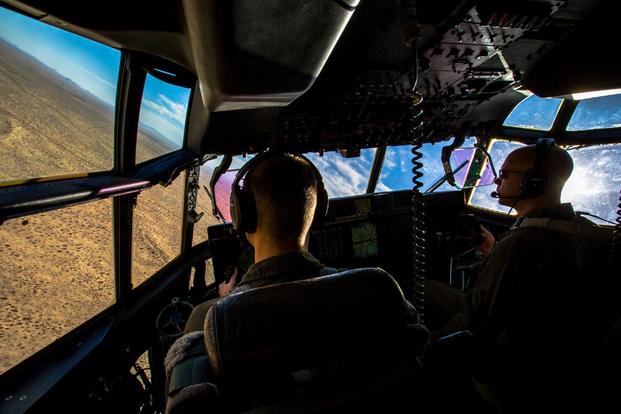MARINE CORPS BASE QUANTICO, Va. -- The Marine Corps will offer pilots up to $210,000 to stay on for another six years as the military fights to keep its aviators from trading in their uniforms for jobs with commercial airlines.
Marine fixed-wing, rotary and tiltrotor pilots will see a slew of financial and flexible-career incentives in fiscal 2019 as part of the service's annual aviation bonus plan. Details will be released in an upcoming Marine Corps-wide administrative message, which Lt. Gen. Michael Rocco, a career aviator and head of Manpower and Reserve Affairs, signed Friday.
"One of the things I'm pretty excited about is that we gave them options," Rocco said. "We gave the [officers] choices ... where if they want to, they can sign up for two, four or six years."
Manpower officials hope staggering pilots' contracts not only stabilizes the "inventory" of aviators so everyone doesn't leave at once, he said, but also signals to Marines that leaders want them to have more choices in their careers.
The Air Force and Navy have announced similar bonuses for pilots. Rocco said the Corps hasn't lost as many aviators to commercial airlines as the Air Force. But the bonuses will help make it competitive with the Navy and Air Force, said Maj. Clif Rateike, the aviation officer planner.
The bonuses will target the captains and majors the Marine Corps wants to retain. Pilots in 10 military occupational specialties -- AV-8 Harrier pilot; F-35B Joint Strike Fighter pilot; F/A-18 Hornet pilot; F/A-18 weapons system officer; MV-22 Osprey pilot; KC-130 Hercules co-pilot; KC-130 pilot; UH-1 pilot; AH-1 pilot; and CH-53 pilot -- will qualify.
Fixed-wing and MV-22 pilots with less than 11 years in uniform who are willing to serve another six will see the biggest bumps with an extra $35,000 per year, or $210,000 paid out over the life of their contract. Marines who prefer a lump-sum option can pocket $178,500 at once, according to a draft copy of the MARADMIN.
Those with less than 11 years in who want to stay only another four years can pocket an extra $30,000 per year, or $120,000 total. Pilots of those aircraft who've served between 11 and 13 years can also earn $120,000 over a four-year contract, and those with 13 to 14 years in qualify for $60,000 over two years.
F/A-18 weapons systems officers and Huey, Cobra or CH-53 pilots with less than 13 years in are eligible for $80,000 over four years. Marines in those MOSs with between 13 and 14 years in can pocket $40,000 -- $20,000 per year -- if they sign on for another two years.
Factors such as retention in a particular MOS and the number of pilots in the pipeline to fill those slots influenced the bonus rates, Rateike said.
But offering incentives to every community is important for morale, Rocco said, adding that, early in his career, he saw some Cobra pilots qualify for bonuses while Huey pilots were left out.
"That's a terrible environment to be in, where somebody's basically doing the same job ... and [one] gets a bonus and you're not," he said. "Here, there is a bonus for everyone."
'A Business Decision'
The Marine Corps can't compete with the salaries some commercial airlines are offering pilots, said Col. Gaines Ward, the manpower plans officer. But bonuses can influence a Marine's decision when it comes time to decide whether to stay or go.
Col. Sean DeWolfe, the aviation colonels monitor, said every Marine reaches that point in his or her career. Deciding whether to sign another contract becomes a personal decision.
"I didn't stick around because there was a bonus. I wanted to be around Marines, and a bonus just happened to be there," he said. "I have acquaintances though where the bonus did keep them in ... because at that point, it becomes a business decision when you reach that crossroad."
Like many Marines, pilots face that decision point around the 10-year mark, Ward said, which is why the aviation bonuses target those around that mark.
Aviation bonuses have been helpful in getting pilots to stay in the past, but it's not the only factor Marines weigh. Pilots' work-life balance and day-to-day life in the squadrons are also areas the Corps is monitoring closely, he added.
Pilots aren't the only Marines who can earn big bonuses in 2019. Earlier this week, leaders announced a host of re-enlistment bonuses for enlisted personnel in dozens of specialties, including squad leaders, air-traffic controllers and counterintelligence Marines.
-- Gina Harkins can be reached at gina.harkins@military.com. Follow her on Twitter at @ginaaharkins.












